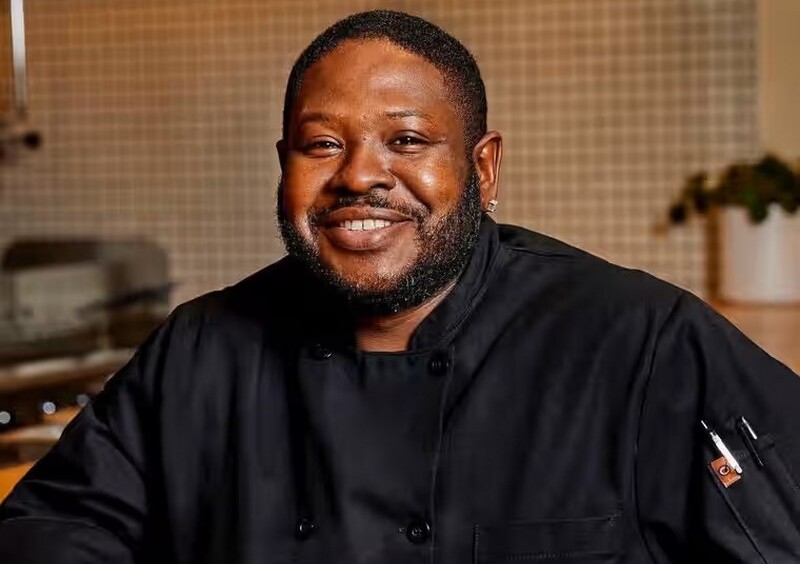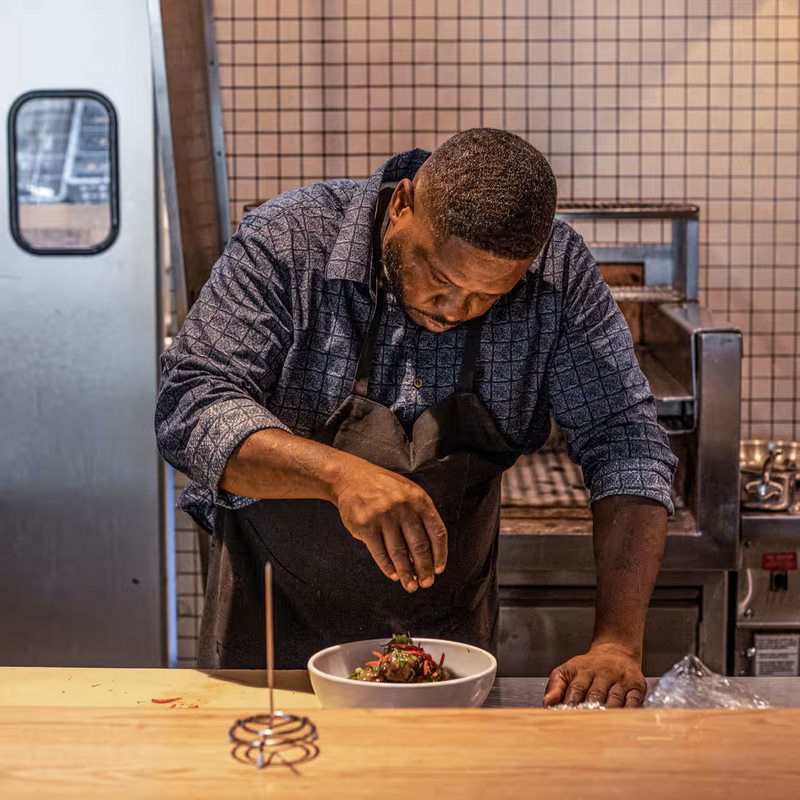
“There are geniuses in there,” said 2-time James Beard Award winner, Keith Corbin, referring to incarcerated men and their ability to cook with the most lifeless, flavorless ingredients imaginable.
Corbin spent 10 years in prison himself, and combined with his career as an award-winning chef at his restaurant Alta Adams, he knows what it takes to make good food out of anything.
Corbin was profiled in a feature piece at the Guardian that twisted together the stories of several entrepreneurs who launched careers in the food industry after more than a decade of smoking sausages in a toilet with toilet paper, or making tamal dough with ground-up Fritos.
Another of the featured ex-cons was Chef Michael Carter, executive at Down North Pizza in Philidelphia where he employs only formerly incarcerated men, or returning citizens as he called them, and offers them half-way or low-income housing with the apartment building located above his pizza shop.
His pies, mostly square ones, have made the New York Times best pizza list, and won the Best of Philly 2021 category for square pie.
After Carter was released from a 12-year sentence, he took a class for resume writing for food professionals and was asked what experience he had. He replied he had cooked in prison for 2,000—he got a job the next week.
“The mission is actually what made me accept the job,” Carter said, “to be able to have a voice and tell people about the plight in our community of returning citizens.”
It’s something that both Carter and Corbin reported to Sonya Singh at the Guardian—that prison squeezes men, and that squeeze sometimes creates diamonds.
“You have people in there that literally never went to school for technology, but the phone breaks and they’ll figure out how to fix the motherboard,” Corbin said. “There’s geniuses in there, ingenuity.”
Corbin, on the other hand, went into prison with a deep connection to food. His grandmother grew tomatoes and collard greens in their yard, and would wake up at 5 a.m. to start cooking for the working people in her community.

In prison, Corbin also fed dozens of people, often with flavorless ingredients. At the commissary, he could requisition packaged food items and try and do his best to squeeze flavor into dishes. He told Singh that he made a Reece’s Peanut Butter Cup by baking syrup-soaked processed peanuts and melting a Hershey’s bar overtop.
The appreciation he got for that particular experiment gave him belief and determination. He would see, Singh wrote in her feature, the Asian inmates fermenting their own kimchi, further expanding his understanding of possibilities in an environment that seems on the surface a largely possibility-less one.
YOU MAY ALSO LIKE: Georgia State University Hails First Class of Inmate Graduates: ‘A degree to utilize when they come home’
Corbin’s Alta Adams restaurant serves a food born of those two worlds—5 a.m. in his grandmother’s kitchen, and 5 p.m. at a California correctional facility. He calls it “California soul.”
At Down North, Carter’s for-profit yet mission-driven restaurant hires returning citizens at $15 per hour, double the state’s minimum wage, and about $3 above the norm for starting restaurant workers.
He and Corbin, along with another food service entrepreneur profiled in the piece, all agreed that re-entry skills are not taught in prison, but that any entrepreneur in hospitality and food service with two brain cells to rub together should set up an interview booth in front of the nearest halfway house, because the desire to work hard and make a decent living if given a chance burns white hot in returning citizens.
MORE GOOD NEWS ABOUT RETURNING CITIZENS: Pentagon Reverses Ruling on the Release of Art Made by Guantanamo Bay Detainees
That last entrepreneur, Chef Sharon Richardson, spent 20 years in prison in New York but now runs Just Soul Catering, which employs only formerly incarcerated women, and Reentry Rocks, a non-profit that helps formerly incarcerated women with histories of domestic violence achieve their goals, become leaders, and rebuild their lives. They offer a food service fellowship program for women.
For Richardson, food service was a healing event in prison, and highlighted one story in particular when the women in her block stayed up late to cook for her after her mother died of a stroke.
You can read the whole Guardian piece here.
SHARE These Enterprising And Inspiring Chefs With Your Friends…
This post was originally published on this site be sure to check out more of their content.






